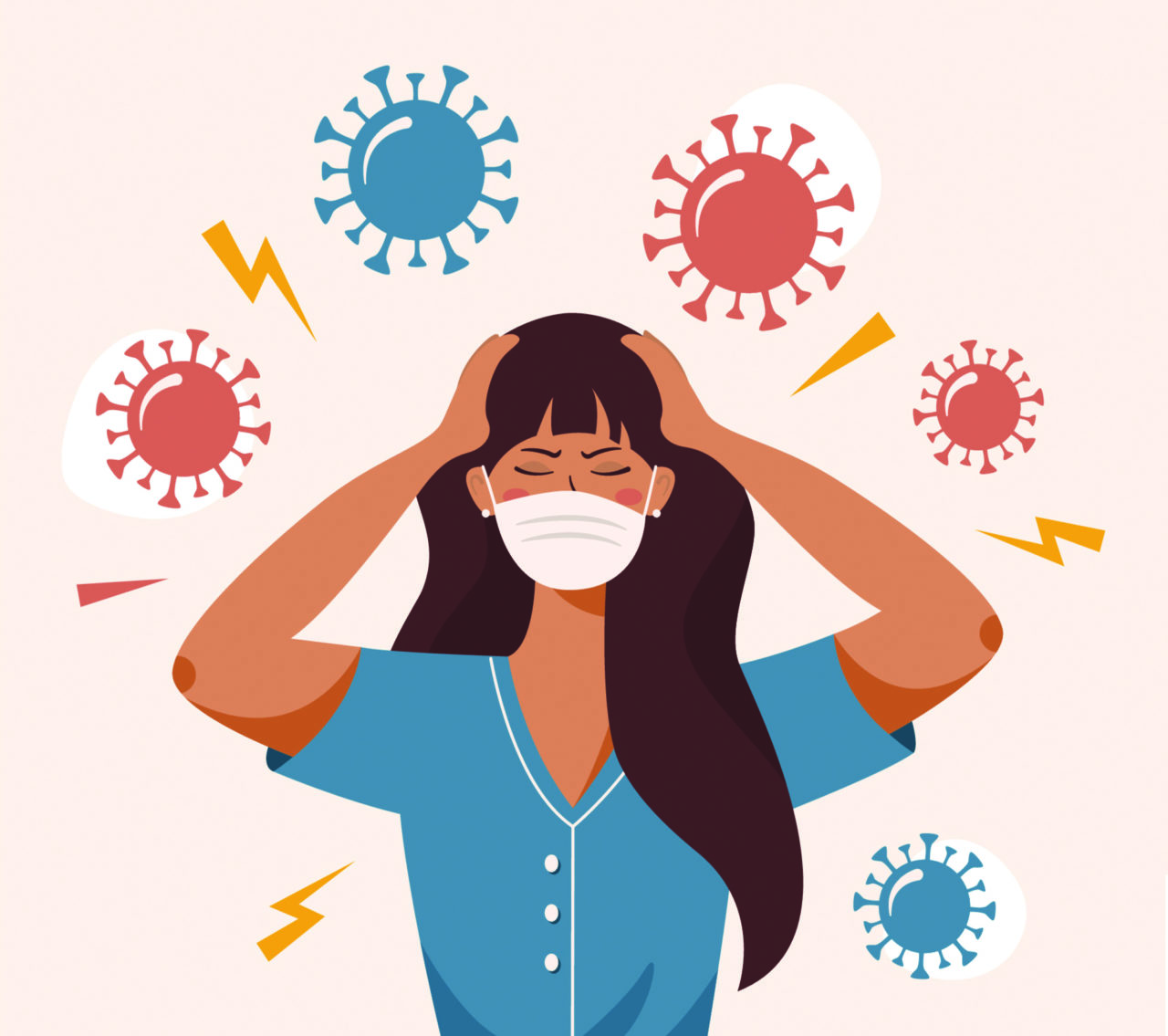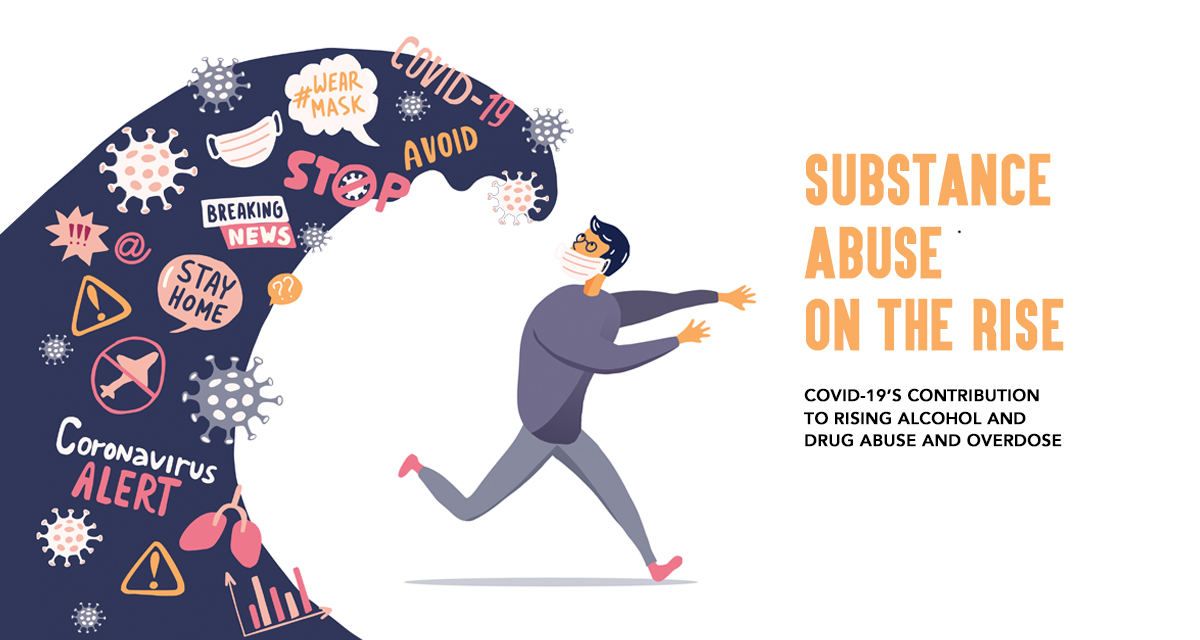COVID-19’S CONTRIBUTION TO RISING ALCOHOL AND DRUG ABUSE AND OVERDOSE
By Dan England
Some of the life events that could lead to drug or alcohol abuse include those that cause heightened anxiety, money problems or isolation. Hello, 2020.
It’s possible, even probable, that everyone this year stared down the barrel of all of them, especially after March, when the pandemic began to rage across the U.S. Maybe you lost your job. Maybe you worried about an older loved one catching the coronavirus, or maybe you’re old and you worried that little cough you had could be the disease that’s killed more than 250,000 in the U.S. this year. Maybe you had money problems this year. Heck, didn’t all of us?
Counselors at SummitStone Health of Fort Collins believe that’s why they saw an increase in patients struggling with, and even overdosing on, alcohol and drugs.
“Each one of those alone is a risk factor,” says Cassie Damato, director of acute services for SummitStone Health, a behavioral health clinic that treats addictions and offers mental health counseling, “and all those factors are exaggerated during a global health pandemic.”
SummitStone probably saw the largest increase in the number of patients with recurring, relapsing or brand-new substance abuse problems, but UCHealth noticed an increase as well, and even agencies that didn’t, such as North Range Behavioral Health in Greeley, are anticipating them. Studies show that simply losing your job, a wide-ranging effect of the pandemic, makes you more likely to abuse drugs and twice as likely to drink more, Damato says.
And if the pandemic wasn’t enough—and it was—we also had the most contentious election in history and racial tension and protests, all while the two largest wildfires in Colorado history burned in our backyard and mucked the very air we breathe. If 2020 was a person, it would have already ripped the head off your favorite teddy bear.

Risky business
We’ve never had a year like 2020. So many crises in one year is testing the best of us, even those who never thought they would have mental health issues.
“Our sense of safety has been pulled up from [under] our feet,” says Jonathan Heilman, a psychiatric nurse practitioner at UCHealth Mountain Crest Behavioral Health Center in Fort Collins. “Even though for so long we’ve been able to manage our anxiety through effective coping skills, this time they may just not work.”
So many of us have lost what helped us cope. Heilman and others, therefore, have seen addictions rise across all economic and social spectrums, and among both the young and the old. He’s seen adolescents who aren’t in school, at least not in person, and not in sports or music or theater drinking more or using more pot, with a steady amount coming in for detoxing.
Seniors who have lost their Bridge groups and visits with their grandchildren are not only using more but giving up, Heilman says, with an increase in senior suicides or attempts.
The isolation we’ve all felt these last few months, as we’ve tried to keep the coronavirus at bay by avoiding each other, has had a price, as it’s taken away our routines and the things we all use to get us through the crap of life. One short Zoom meeting a day has replaced those water cooler conversations at work. We can’t even exercise as much, because the gyms were closed or open limited hours, and smoke from the fires made it dangerous to run, bike or walk outdoors.
“Addiction,” says Alex Murphy with North Range Behavioral Health in Greeley, “blooms in isolation.” Addiction also stems from mental health issues, and many users either had one or developed one from the drastic changes in their lives, such as severe depression or anxiety.
“We are all still adapting to a new normal,” she says, “and all those cumulative stressors run across populations. Even those who may have never dealt with anything may quickly spiral, and that affects the people around them as well.”
Deadly consequences
The turn to substance abuse to cope with so many factors that seem out of our control may have severe, even deadly consequences, Damato says, as there’s been a rise in overdoses in Colorado just as there has been in Larimer County. Many of these come from the use of harder drugs triggered by opioid use.
“Prior to the pandemic, we were in an opioid crisis,” Damato says, “and now we add all that uncertainty in our lives to it.”
Indeed, many have documented the country’s current addiction to opioids triggered by the use, and then the abuse, of painkillers, which then leads to heroin use. Nearly three out of four prescription drug overdoses are caused by painkillers, which cause more deaths than heroin and cocaine combined. “It’s the ease of access,” Damato says.
In 2018, nearly 17 percent of all deaths were related to drug overdoses, according to the Centers for Disease Control, and the total number of opioid-related deaths has grown in recent years, even while other drug-related deaths have dropped, according to statistics provided by Damato.
Those deaths, because of COVID-19, may be rising even more now. Three more Larimer County residents died of drug overdoses, for a total of 28, in the first six months in 2020 than in all of 2019. Fentanylrelated overdoses were up 282 percent in the first five months compared to last year, according to Denver public health records. In Colorado, a record number, 1,062 people, have died from overdose, 50 more than the previous record set in 2017.
Relapsing or reaching out
North Range Behavioral Health of Greeley hasn’t seen the increases that the services in Fort Collins have experienced, although counselors there are seeing more patients struggling with maintaining their sobriety. In the past, counselors would say those patients relapsed.
“But one of the words we are starting to use is recycling,” says Murphy. “It’s not a
linear progression. It’s a tangled mess. You find the ground you’re standing on isn’t as sturdy as you thought. Some make it after one [relapse] and some make it after 99. Relapse isn’t necessarily failure.”
It is, however, still an issue made worse due to COVID, which has damaged the
support systems for recovering addicts, too. Support groups and meetings, for instance, weren’t held in person for months after the onslaught of the virus.
“Virtual, in that case, is just not the same,” Murphy says. “Some wake up for their AA meetings, and in the virtual format, you can get away with more. You can’t smell alcohol on my breath, for instance, virtually.” And now those meetings may have to return to virtual formats, as the pandemic is spreading faster, and it’s getting too cold to meet outdoors.
Murphy and a crew of counselors at North Range were mentally preparing themselves for an increase, but it hasn’t happened there yet. That may be because it can take time for an addiction to develop, Murphy says, as use increases to the point where it’s out of control, or it takes time for a person to admit there’s a problem. But substance abuse also blossoms from trauma, and the aftermath of trauma can surface weeks or even months after challenging events, such as the veterans who suffer from PostTraumatic Stress Disorder after coming home from war.
“We are in the middle of that trauma,” Murphy says. “We anticipate another wave.”
How to treat it
The warning signs that you may have a problem are the same life events that may trigger one, especially if you started using after the event, such as a job loss that’s caused you anxiety, depression or money problems. Another warning sign is isolation, which may be hard to spot, given our need to socially distance. Other signs include feeling stuck, Damato says.
“You’re not moving forward with the grief process of losing something, like your job or routine,” she says. “Your daily activities are changing, or you change who you are, or you lose interest in those activities.”
Damato remains encouraged by the increased awareness around mental health and the reduced stigmas surrounding it. That was a trend even before more people began talking about it after the coronavirus hit. In 2018, Larimer County voters approved a quartercent sales tax dedicated to Larimer County Behavioral Health Services, which will expand services in the county as well as add a regional
facility to coordinate them.
“We are creating more awareness,” Damato says, “and creating greater access to care.” The more that happens, the more people will be comfortable seeking treatment for it, she says. Heilman also advocates for therapy, along with the acknowledgement that the struggle is not only real, it’s every day.
“I was a nicotine user, and there’s the patch, the gum, the vape pen,” Heilman says, “and there will still be someone with a cigarette walking by, and I crave it.” But Heilman can battle it now, and he’s winning that fight so far.
Self-care is important, he says, so small things, such as going for a walk, cooking or listening to music helps, along with talking to friends and knowing that you aren’t alone. The one good thing about COVID-19 is that it affects everyone, so even when you are isolated, you know you aren’t alone.
“That feeling that you are not an alien is crucial,” Heilman says.
Dan England is a freelance writer who lives in Greeley. To comment on this article, email letters@nocostyle.com.






